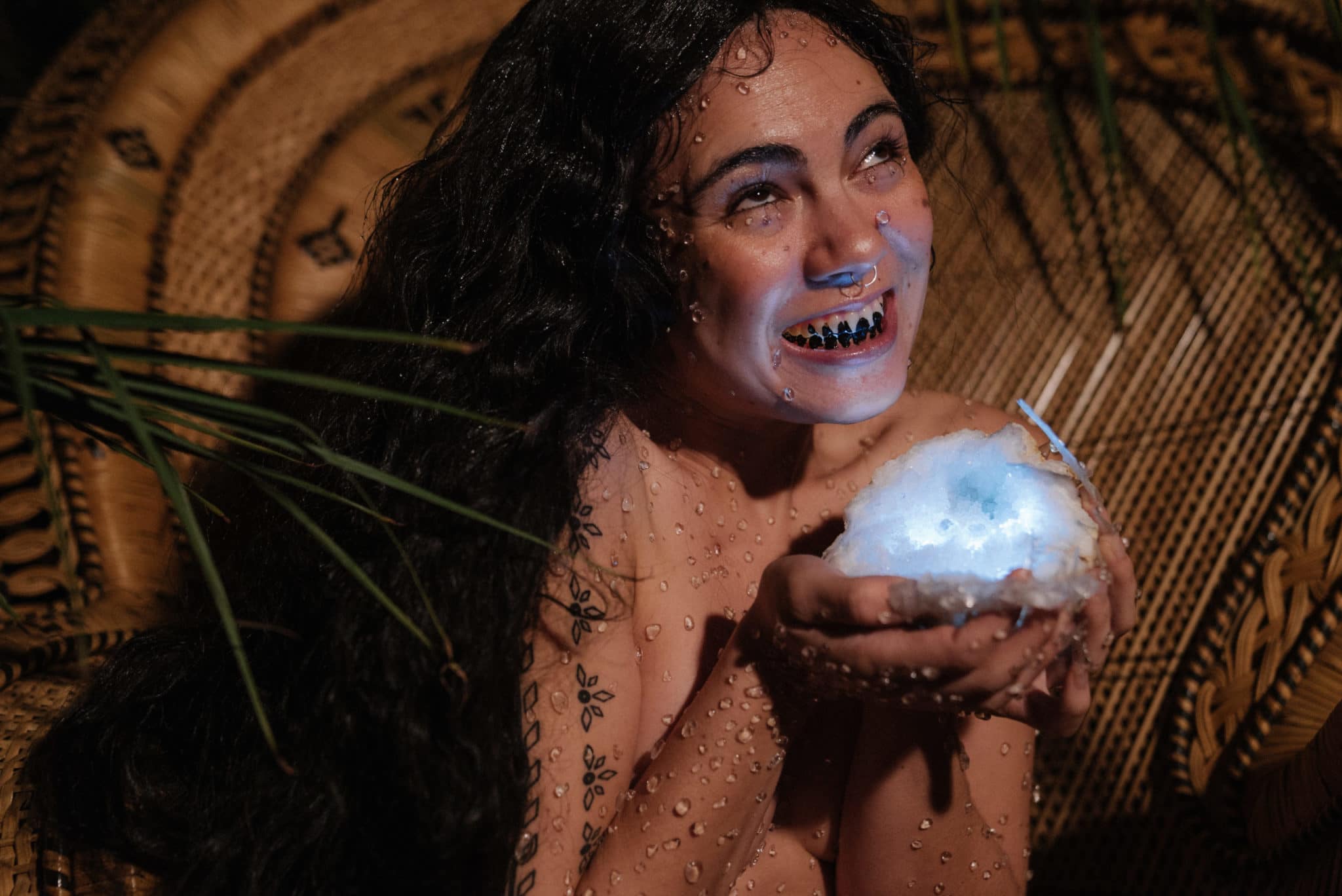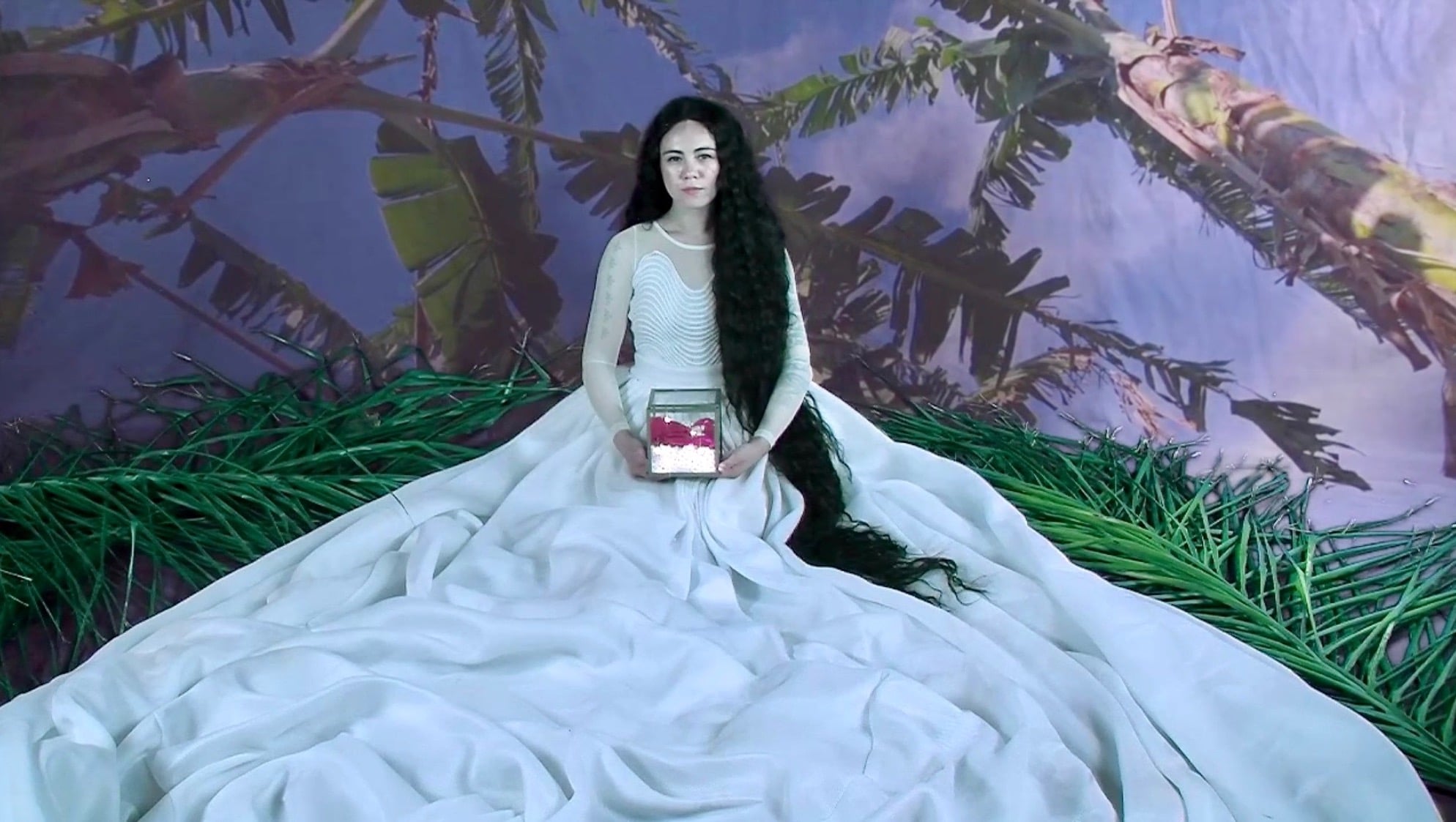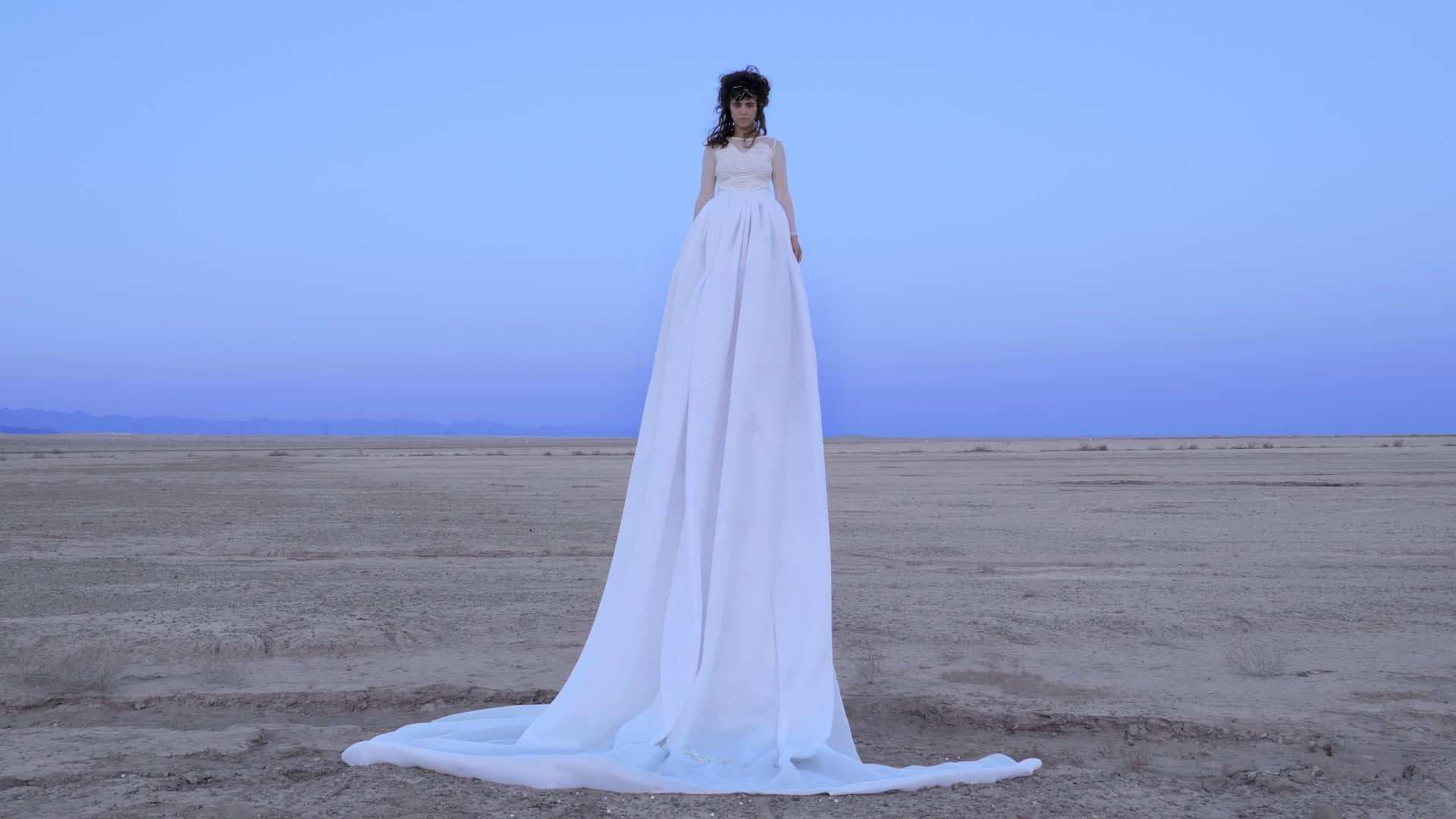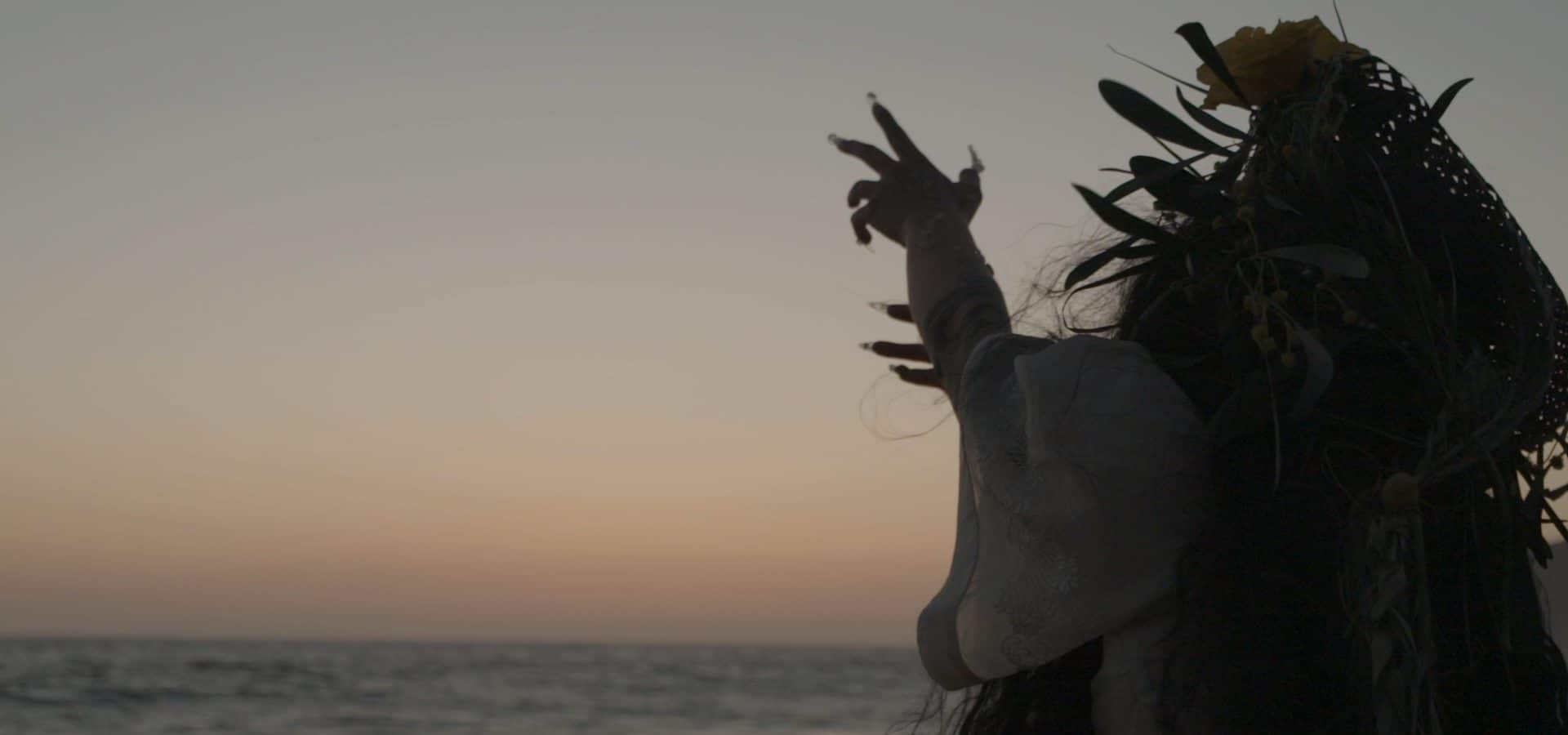Micaela Tobin (Music MFA 16) admits she went through bouts of depression, like many others, during the pandemic. The soprano singer and sound artist’s gigs had been canceled when almost everything came to a grinding halt in March 2020. But amid all the uncertainty of the past year, Tobin found a way to persevere. She focused on the release of BAKUNAWA, her experimental opera album, and created a short film of it that had its virtual premiere on May 1 at Roy and Edna Disney/CalArts Theater (REDCAT).
“My motto for myself since the pandemic started has been that I’m going to respond to the shifting parameters of our reality,” says Tobin, 33. “I’m an improviser, I’m an experimenter, so I figured that I can use those tools to let the reality shape what I make. I’ve had to let go of a lot of expectations and attachments to the outcomes of the way I want things to be, or how I want them to get made, and lean into the unknown, the lack of stability.”
Although BAKUNAWA was released under Tobin’s solo-project moniker White Boy Scream last June, she says she’s been “living” with the titular character of her album for the past three years. Tobin, whose mother hails from the Philippines, first discovered—and fell in love with—the Bakunawa, a moon-eating serpent believed to be responsible for lunar eclipses, when she was studying precolonial Philippine mythology. She decided to record an album that would be a sonic and abstract retelling of the Bakunawa.

As a tie-in to Tobin’s Filipina heritage, BAKUNAWA opens with her mother reciting in Tagalog a poem Tobin wrote about the serpent. “Having my mother’s voice on the album felt important to further contextualize and personalize this subject for me,” Tobin says.
Sonically, White Boy Scream showcases Tobin’s love for noise, drone, distortion, and operatic vocals. She utilizes improvisation, vocal looping, and field recordings of sounds in nature in her pieces. The seashells she uses in BAKUNAWA, her sophomore album following REMAINS, came from the Philippines.
Tobin’s friend, Rhea Fowler, provided string arrangements for her album. The two met when they were teens studying music at Los Angeles County High School for the Arts. Fowler, 32, remembers how Tobin had been following a traditional path for operatic singing, but at the same time, was wearing Nirvana band shirts at school. “I’ve seen her study and build a foundation of technique and knowledge … but then also be intensely creative,” Fowler says. “And those have now converged into her current style.”
Brian Miller, the founder of Deathbomb Arc, which released BAKUNAWA, has been taken aback by Tobin’s commanding voice ever since he first heard it a few years ago. “Her voice is so unique that she’s defining for listeners what it means to create the sound of these ideas,” says Miller, 43. “She’s so much on the bleeding edge …. You just trust her that [this is] what this sounds like, because, [where] else have I ever heard [someone] attempting to do this?”
Tobin, who studied voice performance at the University of California, Los Angeles, hadn’t always been writing experimental operas or music reflecting her Filipina culture. She says she found her time at UCLA to be difficult after realizing that she didn’t have the “type A personality that maybe is needed to pursue a really traditional career path” in opera singing.

Tobin, who’s a Pasadena native, shifted away from classical music altogether and ended up moving to Seattle with her band at the time. There, she experimented with keyboards, loop pedals, and vocal processing. White Boy Scream emerged out of this experimentation.
She later moved back to LA to start applying for graduate schools (she ended up at CalArts, where she’s now part-time faculty), and during this time, attended her first experimental opera performance by her colleague Anna Luisa Petrisko (Music MFA 14). Petrisko recontextualized a Filipino nursery rhyme, “Bahay Kubo,” a song Tobin remembers singing to her grandfather as a child.
“It was that moment where I saw that being performed on stage, and it made me think of my grandfather and … I just started crying,” Tobin says. “I realized, ‘Well, I’d never had that experience in a live performance before where I had seen my culture on stage reflected back to me through this experimental lens and having it hit me like that.’ It was there that I realized, ‘This is what I’ve been missing, even from studying opera for 10 years, all through … high school and college. I’d never seen myself reflected in this way in any performed art. And it really just hit me so deeply.”
That performance became highly influential on Tobin’s work. She began researching how nearly 400 years of colonization had wiped out much of Filipino history and studied how that erasure affected its people. “That affected me a lot because I hadn’t really thought about that, what that kind of intergenerational trauma is, and how far back that goes,” Tobin says.

In “Apolaki,” the last track of BAKUNAWA, the song references the eponymous precolonial Philippine god. Tobin had people of color and members of the queer community record themselves speaking, singing, screaming, and whispering the phrase “they can’t erase us.” She layered the recordings into a sound wall.
“It’s something that [people] across all marginalized voices that experience intersectional oppression can relate to,” Tobin says, “but specifically for Filipinos. For us, it’s potent, because a lot of us are really feeling that we don’t want to be erased. I see a lot of Filipino people, in different ways, trying to dig into our precolonial culture or understand and grasp how colonization has affected us as a people and how we can work to [heal and] give more visibility to ourselves. Especially now, given the spike in AAPI violence in the U.S., that feels even more potent.”
Since Tobin wasn’t able to tour BAKUNAWA due to the pandemic, she had to rethink how she was going to put her music out in the world. She decided to expand upon her album by creating the short film, BAKUNAWA: Opera of the Seven Moons, a cinematic retelling of the story.
In addition to including the music from the album, Tobin performs a Filipino love song that is special to her grandparents and adds more vocals and Fowler’s string arrangements. She also includes field recordings she made with School of Art Faculty Maria Maea, a Samoan-Mexican American multidisciplinary artist, who wove palm leaves while they had conversations about family ancestry, immigration, and art-making during the pandemic.
Tobin feels grateful that her BAKUNAWA project has kept her busy for the past year. She’s also learned to let herself breathe a bit and take time to enjoy art other people are making.
“…You have to give yourself that downtime, the … period to zone out, to sleep if you need to, to not feel like you have to make things all of the time…,” Tobin says, “so then there is actually space for that spark of inspiration to come in.”







